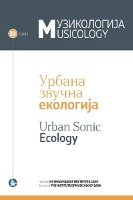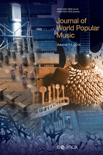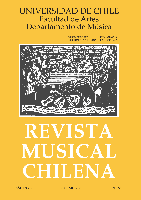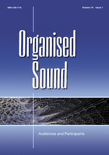
World of Music-New Series
Scope & Guideline
Advancing music scholarship through innovative research.
Introduction
Aims and Scopes
- Ethnomusicology and Cultural Studies:
The journal emphasizes ethnomusicological research that explores the cultural significance of music within diverse communities, examining how music interacts with identity, tradition, and social change. - Sound Archives and Preservation:
A significant focus is on the study and preservation of sound archives, particularly the challenges of digitization, repatriation, and the ethical implications of archival practices in ethnomusicology. - Globalization and Music:
The journal addresses the effects of globalization on local music practices, investigating how global influences reshape traditional music and cultural expressions. - Intercultural Dialogue and Musicology:
It promotes research that fosters intercultural dialogue through music, examining how musical engagements can bridge cultural divides and enhance understanding across communities. - Music and Social Justice:
The journal explores the role of music in social movements and its potential to advocate for social justice, reflecting on how music can be a tool for activism and community empowerment.
Trending and Emerging
- Digital Ethnography and Remote Engagement:
Recent publications increasingly focus on digital ethnography, particularly in the context of the COVID-19 pandemic, showcasing how online platforms facilitate research and community engagement in music. - Music and Health during Crises:
There is a growing interest in exploring the role of music in health and well-being, particularly during crises such as the pandemic, highlighting music's therapeutic potential and community resilience. - Repatriation and Decolonization of Sound Archives:
The journal has seen an uptick in discussions surrounding the repatriation of sound archives, emphasizing the importance of ethical practices and decolonizing music studies. - Intercultural Collaborations:
Emerging research emphasizes intercultural collaborations in music creation and performance, reflecting a globalized approach to musical practices that fosters cross-cultural understanding. - Environmental Justice and Music:
There is an increasing focus on the intersection of music and environmental justice, exploring how musical practices relate to activism and the representation of marginalized voices in environmental discourse.
Declining or Waning
- Historical Music Education Practices:
Research focusing specifically on traditional music education practices has decreased, likely due to a broader emphasis on contemporary applications and community-driven educational models. - Regional Studies with Narrow Focus:
There is a decline in publications that concentrate solely on specific regional music traditions without a broader contextual analysis, as the journal increasingly favors interdisciplinary and global approaches. - Theoretical Frameworks from Previous Decades:
Older theoretical frameworks, such as those solely based on Western musicology perspectives, are less frequently utilized, signaling a shift towards more inclusive and diverse methodologies. - Traditional Ethnomusicological Fieldwork:
The emphasis on conventional fieldwork methods has diminished, as researchers explore innovative approaches such as online ethnography and digital engagement in response to contemporary challenges. - Narrowly Defined Genres:
There has been a reduction in studies that focus exclusively on narrowly defined music genres, with a growing interest in cross-genre influences and hybrid musical forms.
Similar Journals

REVUE DE MUSICOLOGIE
Charting New Territories in Music ResearchREVUE DE MUSICOLOGIE is a prominent academic journal dedicated to the diverse field of musicology, published by EDITIONS TRANSATLANTIQUES in France. With an ISSN of 0035-1601, this journal has been a key platform for researchers and scholars since its inception, fostering scholarly discourse and advancing the understanding of music's cultural, theoretical, and historical dimensions. Although it currently holds a Q4 category in Music according to the 2023 quartiles and is ranked #140 in the Scopus Arts and Humanities Music category, REVUE DE MUSICOLOGIE continues to publish valuable insights that contribute to the global musicological landscape. The journal does not offer open access, adhering to standard subscription models. Its primary objective is to provide a rigorous forum for original research articles, reviews, and theoretical discussions, making it an essential resource for academics, professionals, and students in the field of musicology. Located at 50 RUE JOSEPH DE MAISTRE, 75018 PARIS, FRANCE, it promises to remain a vital part of music research through 2023 and beyond.

INTERNATIONAL REVIEW OF THE AESTHETICS AND SOCIOLOGY OF MUSIC
Exploring the Cultural Resonance of MusicThe INTERNATIONAL REVIEW OF THE AESTHETICS AND SOCIOLOGY OF MUSIC, published by the Croatian Musicological Society, is a pivotal scholarly journal dedicated to the intricate intersection of music, aesthetics, and sociology. With a special focus on exploring the cultural and social dimensions of music, this journal serves as a platform for researchers, professionals, and students alike to disseminate innovative ideas and transformative research. Although it operates under a traditional access model, the journal's impact within the field of music studies is underscored by its commendable Scopus ranking in the Q3 category and its established history from 2009 to 2016, with a renewed focus from 2018 to 2023. With an ISSN of 0351-5796, it continues to shape academic discourse with its insightful contributions and is essential for those aiming to engage deeply with the evolving dynamics of music in society.

Musicology Today
Shaping the Future of Musicology TogetherMusicology Today, published by SCIENDO, is a pivotal journal in the field of musicology, presenting a platform for scholars, researchers, and practitioners to disseminate their findings and engage with current trends in music research. With its ISSN 1734-1663 and E-ISSN 2353-5733, the journal aims to provide a comprehensive overview of various aspects of music, including theory, history, and ethnomusicology, fostering a multidisciplinary dialogue among its contributors. Located in Warsaw, Mazovia, Poland, this journal is not only committed to high academic standards but also to promoting open access to knowledge, thereby enhancing accessibility for a global audience. As it continues to bolster its reputation in the academic community, Musicology Today plays an essential role in shaping the future of music scholarship and invites the engagement of seasoned researchers and emerging voices alike.

Muzikologija-Musicology
Transforming Music Research into Global DialogueMuzikologija-Musicology, published by the esteemed Serbian Academy of Sciences and Arts, Institute of Musicology (SASA), serves as a pivotal platform for scholarly discourse in the field of musicology. With its ISSN 1450-9814 and E-ISSN 2406-0976, this open-access journal has been committed to disseminating high-quality research since 2002, making significant contributions to the understanding and analysis of music in diverse cultural contexts. Located in Belgrade, Serbia, the journal proudly holds a Q2 ranking in the Music category for 2023, reflecting its high-impact contributions as evidenced by its Scopus rank of #136/180 and a percentile of 24th. Covering a wide array of topics within music, from ethnomusicology to music theory and history, it invites contributions that push the boundaries of music research. By fostering an open-access model, Muzikologija-Musicology aims to ensure that its findings are accessible to a global audience, thereby enriching the discourse and fostering collaboration in the musicology community.

Journal of World Popular Music
Bridging Cultures Through the Rhythm of Popular MusicJournal of World Popular Music, published by EQUINOX PUBLISHING LTD, serves as a pivotal platform for scholars and practitioners within the evolving field of popular music studies. With an ISSN of 2052-4900, this esteemed journal has notably positioned itself within the Q2 category of Music as of 2023 and ranks at #90 out of 180 in the Arts and Humanities sector according to Scopus metrics. Spanning research from 2014 to 2023, the journal invites contributions that span diverse musical genres, cultural studies, and global perspectives, ultimately enriching the discourse surrounding the sociocultural impact of popular music. While not open access, the journal offers a robust platform for interdisciplinary research, making it indispensable for researchers, educators, and students keen on exploring the dynamics of popular music and its role in contemporary societies.

Sic-A Journal of Literature Culture and Literary Translation
Cultivating a Global Conversation on Literature and CultureSic-A Journal of Literature Culture and Literary Translation, published by UNIV ZADAR in Croatia, is an esteemed Open Access journal that has been empowering academic dialogue since 2010. With a focused scope on literature, culture, and the intricacies of literary translation, this journal serves as a vital resource for researchers, professionals, and students alike. Although currently listed in the Q4 category for both Linguistics and Language and Literature and Literary Theory in 2023, Sic-A is committed to fostering high-quality research that bridges linguistic and cultural divides. The journal's impact within Scopus rankings, placing it within the 25th and 10th percentiles for various arts and humanities categories, signifies its growing relevance in the field. As it converges into a new era from 2019 to 2024, Sic-A invites contributions that explore the transformative power of literature and translation in a global context, providing an accessible platform for dissemination of innovative ideas and research findings.

FONTES ARTIS MUSICAE
Advancing the discourse in music and information sciences.FONTES ARTIS MUSICAE, with ISSN 0015-6191 and E-ISSN 2471-156X, is a distinguished journal published by A-R EDITIONS, specializing in the fields of Music and Library and Information Sciences. Established in the United States, this journal serves as a vital resource for scholars, practitioners, and students engaged in the exploration and analysis of music and its associated disciplines. With an established converged publication history from 2002 to 2024, FONTES ARTIS MUSICAE has consistently contributed to the discourse within its scope, reflected in its current quartile rankings of Q4 in Library and Information Sciences and Q3 in Music for 2023. Although not an open-access journal, it offers essential insights and research findings, appealing to a diverse academic audience. Its position within the 18th percentile of the Arts and Humanities (Music) category and 11th percentile in Library and Information Sciences underscores its growing significance in these fields, making it a critical platform for advancing knowledge and fostering collaboration.

Revista Musical Chilena
Fostering Critical Dialogue in the World of MusicRevista Musical Chilena, an esteemed publication from the Faculty of Arts at Universidad de Chile, has been a pivotal platform in the field of music and cultural studies since its inception in 1945. With a commitment to open access, this journal promotes the dissemination of innovative research and critical discourse that bridges the gap between cultural theory and musical practice. Holding a notable Q2 ranking in both the Cultural Studies and Music categories as of 2023, it serves as a vital resource for scholars and professionals alike. The journal's inclusion in the Scopus database, with rankings that reflect its influence in the arts and humanities, underscores its significance in shaping the contemporary landscape of music studies. Given its convergence of research output from 2007 to 2024, Revista Musical Chilena continues to engage its audience with diverse scholarship that reflects Chilean musical heritage and global cultural dynamics.

Organised Sound
Pioneering the Future of Music and Sound TechnologiesOrganised Sound, published by Cambridge University Press, stands as a pivotal journal in the fields of Music and Computer Science Applications, reflecting its commitment to advancing interdisciplinary research related to sound and music technologies. Established in 1996, this biannual journal encourages the exploration of new forms of composition, performance, and listening practices using contemporary technological advancements. With an impressive Q1 ranking in Music and a notable place within the top 79th percentile of its category according to Scopus, Organised Sound provides a unique platform for researchers, practitioners, and artists to share innovative ideas and collaborate across disciplines. The journal's rigorous peer-review process ensures high-quality contributions that are informed by the latest theoretical and practical developments. Although currently not an open-access journal, it remains highly regarded for its scholarly depth and relevance in today’s rapidly evolving soundscape.

Muzikoloski Zbornik
Exploring the Depths of Musical HeritageMuzikoloski Zbornik is a prominent open-access journal in the field of musicology, published by the esteemed University of Ljubljana Press since 1965. Hailing from Slovenia, this journal has been dedicated to advancing the study of musical heritage, theory, and practice, serving as a vital platform for researchers, professionals, and students alike. With a notable Q2 category ranking in the field of music and a Scopus ranking of 109 out of 180 in Arts and Humanities, Muzikoloski Zbornik showcases high-quality research, fostering discourse and collaboration among scholars globally. The journal embraces a diverse range of topics, from ethnomusicology to music education, ensuring its relevance in an ever-evolving academic landscape. By providing unrestricted access to its content, it champions the dissemination of knowledge and supports the growth of the musicology discipline.